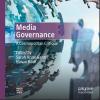Reporting on Latino/a/x Communities

Edited by Teresa Puente, Jessica Retis, Amara Aguilar and Jesus Ayala Rico, this book offers a critical and practical guide for journalists reporting on issues affecting the Latinx community.
In this section we announce recently published books by IAMCR members to the IAMCR community. If you are a member of IAMCR and would like to have your recent book listed, send us a message...

Edited by Teresa Puente, Jessica Retis, Amara Aguilar and Jesus Ayala Rico, this book offers a critical and practical guide for journalists reporting on issues affecting the Latinx community.

Edited by Abiodun Salawu, Tshepang Bright Molale, Enrique Uribe-Jongbloed and Mohammad Sahid Ullah, this book brings together voices from the margins in underrepresented regions of the Global South, within the context of scholarship focusing on indigenous languages and development communication.

By Abdullah Alhuntushi and Jairo Lugo-Ocando, this book examines the main issues and challenges that science journalism faces in the MENA region while analyzing how journalists in these countries cover science and engage with scientists.

Edited by Gisela Gonçalves and Evandro Oliveira, this handbook brings together multidisciplinary and internationally diverse contributors to provide an overview of theory, research, and practice in the nonprofit and nongovernmental organization (NGO) communication field.

Edited by Joan Pedro-Carañana, Eliana Herrera-Huérfano and Juana Ochoa Almanza, this book examines communicative justice from the perspective of the pluriverse and explores how it is employed to work towards key pluriverse goals of environmental, cognitive, sociocultural, sociopolitical, and political economy justice.

Edited by Lina Dencik, Arne Hintz, Joanna Redden and Emiliano Treré, this book outlines the intricate relationship between datafication and social justice, exploring how societies are, will, and should be affected by data-driven technology and automation.

By Ralph Engelman and Carey Shenkman, this book offers an unprecedented and panoramic history of the use of the Espionage Act of 1917 as the most important yet least understood law threatening freedom of the press in modern American history.

By Simon J. Potter, David Clayton, Friederike Kind-Kovacs, Vincent Kuitenbrouwer, Nelson Ribeiro, Rebecca Scales, and Andrea Stanton, this book sets out a new research agenda for the history of international broadcasting, and for radio history more generally.

By Asta Zelenkauskaite, this open access book argues that affect-instilled arguments used in public deliberation in times of uncertainty, along with whataboutism constitute a playbook for chaos online.

Edited by James Meese and Sara Bannerman, this volume explores how governments, policymakers and newsrooms have responded to the algorithmic distribution of the news.
Edited by Jason Paolo Telles, John Charles Ryan and Jeconiah Louis Dreisbach, this book addresses the increasingly important subject of ecomedia by critically examining the interconnections between environment, ecology, media forms, and popular culture in the Southeast Asian region.
Edited by Philippe J. Maarek, this book presents a comparative perspective on different government communication strategies to COVID-19 around the globe.

By Christian Fuchs, this book explores how Humanism can help us to critically understand how digital technologies shape society and humanity, providing an introduction to Humanism in the digital age.

Edited by Panayiota Tsatsou, this collection offers an up-to-date examination of the role of digital inclusion in vulnerable people’s social inclusion.

Edited by Yonty Friesem, Usha Raman, Igor Kanižaj and Grace Y. Choi, this handbook showcases how educators and practitioners around the world adapted their routine media pedagogies to meet the challenges of the COVID-19 pandemic, which often led to significant social, economic, and cultural hardships.

Using southern Africa as a backdrop, and its liberation history, Jane Duncan examines what an anti-capitalist perspective on intelligence and security powers could look like.

Edited by Abiodun Salawu and Israel A. Fadipe, the first volume explores the nature, philosophies and genres of indigenous African popular music, while the second volume examines how African indigenous popular music is deployed in democracy, politics and for social crusades by African artists.

Edited by Katarzyna Kopecka-Piech and Mateusz Sobiech, this volume brings together an international team of authors to investigate a wide range of issues concerning the fundamental role of media technologies in shaping contemporary emotional life.

Edited by Louisa Ha and Lars Willnat, this book illustrates how professional and user-generated media can reduce international conflicts, foster mutual understanding, and transcend nationalism and ethnocentrism.

By Pradip Thomas, this book explores the role of both the public and private sectors in the shaping of information infrastructures in India.

In this book, Marc Raboy weaves together personal and family memoir with investigative journalism, exploring the parallels and determinative differences resulting from both character and circumstance.

Edited by Herman Wasserman and Dani Madrid-Morales, this book discusses the similarities and differences of disinformation in different regions and provides a broad thematic overview of the phenomenon as it manifests across the Global South.

Edited by Jorge Vázquez-Herrero, Alba Silva-Rodríguez, María-Cruz Negreira-Rey, Carlos Toural-Bran and Xosé López-García, this book aims to explore the diverse landscape of journalism in the third decade of the twenty-first century, constantly changing and still dealing with the consequences of a global pandemic.

A comprehensive critique of podcasting as a new medium and booming industry, and an expert insider analysis of storytelling podcasts, by award-winning narrative podcast producer and leading international audio scholar Siobhan McHugh.

By Francesca Musiani and Ksenia Ermoshina, this book sets out to explore one of the core battlegrounds of Internet governance: the encryption of online communications.

Edited by Gauri D Chakraborty, this book details the work of 503 women who graduated from Film and Television Institute of India (FTII) between 1965-2016 through self narratives and bionotes on contribution in the media and entertainment industry.

Edited by Bhanu Bhakta Acharya and Shyam Sharma, this book explores key issues about the state of media and journalism practices of Nepal and situates them against the professional standards of global journalism and journalism education.

Edited by Bruce Mutsvairo and Nnamdi T Ekeanyanwu, this book investigates the transformations in Nigeria’s booming communication industry.

By Terry Flew, this book offers the most current research about how regulation of digital platforms can be achieved

Edited by Emmanuel K. Ngwainmbi, this book analyzes how social media and its networked communities have literally compromised individual and ethnic group identities.

By Maarit Jaakkola, this book examines how ordinary users review cultural products online, ranging from books to films and other art objects to consumer products.

By Lee Artz, this book showcases how transnational media operate in the contemporary world and what their impact is on film, television, and the larger global culture.

Edited by Surbhi Dahiya and Shambhu Sahu, this book offers an extensive and pioneering study of reporting for all the news beats, and news writing and editing.

By Sandra Jeppesen, this book is a behind-the-scenes investigation into how global activists use technology.

By Deepti Ganapathy, this book looks at the media’s coverage of Climate Change and investigates its role in representing the complex realities of climate uncertainties and its effects on communities and the environment.

Edited By Giuliana Sorce, this book examines the central role media and communication play in the activities of Non-Governmental Organizations (NGOs) around the globe.

By Julia M. Hildebrand, this book offers a unique interdisciplinary exploration of the spatial, mobile, visual, and relational dimensions of aerial play by drones.

By Cherian George and Sonny Liew, this book, rendered entirely in graphic form, is a survey of 21st century censorship as experienced by political cartoonists around the world.

Edited by John C. Pollock and Douglas A. Vakoch, this is one of the first books uniting an international team of scholars to investigate how media address critical social, political, and health issues connected to the 2020-21 COVID-19 outbreak.

By Philippe Bouquillion, this book identifies and analyses the main socio-economic trends that characterize Vivendi, the French mass media conglomerate, and explores how they have oriented its development and evolution.

By Bridget Backhaus, this book looks at the rich and complex history of broadcasting and community broadcasting in the multicultural and multilingual milieu in India.

Edited by Daniela V. Dimitrova, this book provides an overview of the key issues in global journalism today and traces how media systems have evolved over time in different world regions.

Edited by Gabriele Balbi, Nelson Ribeiro, Valérie Schafer and Christian Schwarzenegger, this book analyzes some of the most well-known and fiercely discussed concepts of the digital age from a historical perspective. Open access available.

By Jonathan Hardy, this book is a critical study of the changing relationship between media and marketing communications in the digital age.

By Christian Fuchs, this book analyses the changes of everyday communication in the COVID-19 crisis and how misinformation has spread online throughout the pandemic.

By Surbhi Dahiya, this book is as much a telling of the legacy of India’s pioneering media enterprise as it is about the people and the strategies behind it.

Edited by Daniel Jackson, Alina Bernstein, Michael Butterworth, Younghan Cho, Danielle Sarver Coombs, Michael Devlin and Chuka Onwumechili, this publication captures the immediate thoughts, reflections, and insights from the 2020 Olympic and Paralympic Games from the cutting edge of sport, communication and media research.

By Nico Carpentier, this book combines photography and written text to analyse the role of memorials and commemoration sites in the construction of antagonistic nationalism.

By Guillermo Mastrini, Martin Becerra and Ana Bizberge, this book examines the media conglomerate Grupo Clarín, the largest communication group in Argentina, and one of the main communications groups in Latin America.

Edited by Anna Gladkova and Sadia Jamil, this book focuses on ethnic journalism in the Global South, approaching it from two angles: as a professional area and as a social mission.